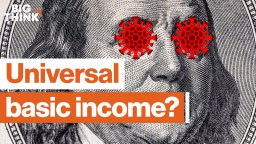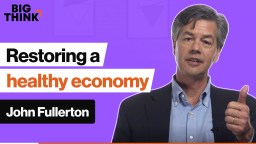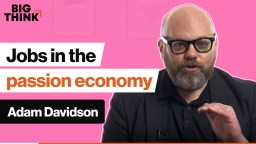ADAM DAVIDSON: I had this thought as I wrote the book that the best of the twenty-first century combines the best of the nineteenth and the best of the twentieth. And then my joke is the worst, combines the worst of those two centuries as well. What I mean by that is if you look at the nineteenth century and pretty much all human history before business was conducted almost entirely locally. You almost all physically made goods. They were made by someone who you didn't just know them your whole life, your great grandparents knew their great grandparents. And in many cases your clothes, your bed, your house were made by you or your family. And to the extent that there were services the equivalent of lawyers and accountants and doctors. Those would also have been produced locally. There's always been long distance trade but that was really just a very small number of luxury goods that had very little impact on the material lives of everyday people.
So you had profound intimacy to the point where if you lived in a certain neighborhood in Brooklyn or a certain village in France, the beer, the bread, the cheese—everything was how we do it here. It was fully intimate. And you go two villages over and they do it some other way that's totally different. And so you had this incredible enmeshment between producers and consumers.
Then you have the twentieth century which is about people in one place producing goods for people all over the world. So you have massive manufacturers in Atlanta or New Jersey or Chicago who are producing soda and candy bars and eventually furniture and cars and all of these goods. And they're made in one place, made in huge volume and then shipped everywhere in the world. And just the nature of that kind of transaction is scale. You can't know all that much about who's buying Coca Cola in some village in Vietnam or what things about a Ford car people in South Carolina like better than people in Alabama do or whatever. You just make, you know, with some variation you make the same set of products and ship them everywhere. And so that's scale and scale brings a lot of benefits that small intimacy doesn't. The benefit is an economy of scale. You can make more stuff more cheaply, spread it to more places.
But now that doesn't work very well. Big scale is in crisis. You look at the big scale consumer goods companies like Proctor & Gamble or Unilever and they're really struggling for growth. They're struggling to basically everyone who wants Tide soap and Oreo cookies already has Tide soap and Oreo cookies. And you sort of go by a candy aisle and you see the problem. Sure, we can have M&M's with pretzels and M&M's with caramel and M&M's with peanuts and M&M's with a million other things but you're not really transforming the experience of eating candy. And we live in a world where people are probably eating as much candy as you want. So you have these companies fighting over market share sort of unable to create really transformative value.
But then you have intimate products. You have products like let's use chocolate. You have entrepreneurs creating new ways of producing lovely chocolate bars but they don't have to only produce for people within walking distance or driving distance of their factory. And they don't have to produce 300 billion a day to get them all over the world. They can produce a reasonable amount of them and they can use the tools that the twenty-first century offer. The internet, of course, but shipping and logistics. There's been revolutions that make it just so much more affordable for a relatively small company to physically get stuff all over the world without owning big trucks, without owning big warehouses. Artificial intelligence is making it increasingly possible to match unique producers with unique buyers to get the, to combine the product with the buyer who most values it. And so that is what I call intimacy at scale, allowing you to do the nineteenth century thing of creating that unique thing. I often talk about candy and bread and beer because you can picture it but the same goes for accounting services and advertising services and medical and a million other, pretty much any kind of business to consumer or business to business product or service you can think of. And it allows you to do those things but do them at scale. Do them where you're reaching people all over the world who most want what you have to offer. That's the key.
We all know the Adam Smith "price is where supply meets demand." And the assumption with Adam Smith in "The Wealth of Nations" is that products are just this undifferentiated thing. Bread is bread and so you, if people start liking bread more and paying more money than new people make bread. And the way economists talk about it is price is actually at the point of indifference, or they call it the curve of indifference for complicated reasons. But basically you're selling to the least interested buyer. That's the price. If a pack of Oreo cookies costs $2.99 that's because they've figured out that if it was $3.05 some people would be like forget it, I'm not going to buy it. So you're targeting the least interested buyer.
The passion economy is about targeting the most interested buyer so the indifference price is rooted in the idea that you need that kind of massive scale to reach everyone. You need that last buyer to buy your thing to make the whole system work. But with the passion economy you could just focus on way up on the demand scale where people so love your product they'll pay far more for it, maybe $6 or $12 or $18, whatever it might be. And that, it's not just that you're getting more money from those people unfairly, it's that you're creating a product that can only exist if you're able to produce a product at that price which you can't do in the old system.





